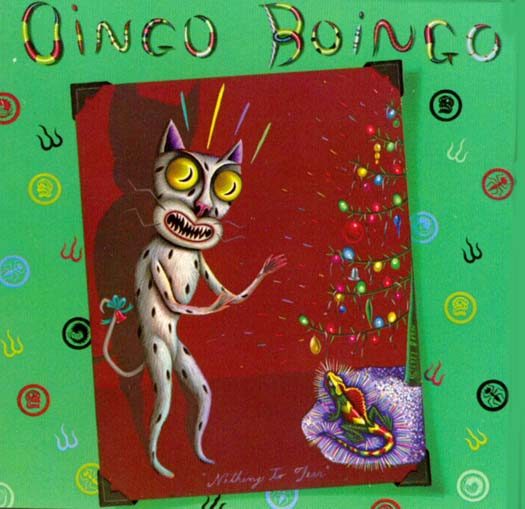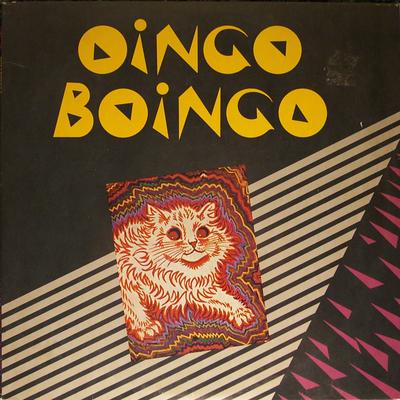
OINGO BOINGO
-Jesse Conway
Why should I be "justifying my love" for a band that I've loved for the past fifteen years? This was the question I asked myself as I kept pushing back writing this article. It's not that it gave me an excuse to push it back or yielded any kind of answer to the question, it simply gave me an excuse to put off writing as I grew angrier at the task of proving to all you plebeians out there that Oingo Boingo records are worth the $4 you'll be able to pick them up for at your record store. Here goes.
If you mention Oingo Boingo in casual conversation, you'll either receive a blank look or a response of "Oh yeah, Back to School, man, cool." Yes, how amazing, they WERE the party band in the mid-80's coming-of-age comedy staring Rodney Dangerfield, but their performance was already four years removed from what many might consider their last relevant release. "Dead Man's Party" is a great hit single, but the album was lacking, just like their previous release, "Good For Your Soul." The real meat of the Oingo Boingo discography lies in their s/t 10" from 1980, the 1981 debut album, "Only a Lad" and its follow up a year later, "Nothing to Fear."

Look at the cover of "Only a Lad" and you'll see a normal-looking scout traipsing through the clouds. Look closer and you'll see a patch of the 10" cover on his breast pocket and one of his hands possessing claws and a skin tone that is generally reserved for The Creature from the Black Lagoon. For 1981, this was nothing shocking. The back features photos of all eight band members who played on the release. Eight may seem like a lot, but not a single member had a chance to take a rest throughout the course of their records and live shows.
"Little Girls" kicks off their debut album - and what a way to establish yourself. "Hello world, we know what it's like to be a pedophile; it's okay, it really is." As the song winds its way through the poppy call and response of the vocal and guitar melodies, the lyrics gradually turn more and more self-aggrandizing and turn downright aggravated when the next song, "Perfect System," kicks in. It's a standard new-waver, but Danny Elfman growls like an angry pup throughout its verses and choruses. In an attempt to justify the band's place in the LA punk/wave scene, "On the Outside" takes pot shots at disco, punk, teachers, hipsters and norms, while "Capitalism" contains more anti-punk sentiment, even though it's mainly railing against rich kids from the suburbs coming into town to act punk. Who'd think that there was such a problem in 1981? I guess this was LA, not Boston, after all. Side A ends with a very distinctive take on The Kinks' "You Really Got Me."
You've probably noticed that I haven't written much about the specifics of Oingo Boingo's sound - and their sound is the reason you should be giving them a chance. I'd like to say this is because it's so hard to pin them into just one category. Danny Elfman, the main songwriter (alongside guitarist Steve Bartek), attended some classical theater and orchestral training before Oingo Boingo came into being. This training took over the songwriting and composition of the band's songs and many of the moods and themes he'd revisit in many of his movie scores in later years while working with Tim Burton. A m�lange of styles ranging from punk, ska and just plain pop - sometimes featuring heavy metal-style guitar - would be arranged to take the listener on a three-minute journey through the lyrical landscape that he created. It's not easy to mix all of these styles, unless you have a set of instruments playing pieces of each one individually. This eventually came together to create the Oingo Boingo sound during the big choruses that the band was known for. Elfman's knowledge of composition really propelled the group from more than just a band to more of a rock orchestra.
Maybe this has given you some idea of their sound. Maybe it hasn't. On to side B.
The title track is a total barnstormer. Had they opened the album with this track, it would have set a mood somewhat hard to keep up with for the rest of the listener's time. Simply starting one side with it works well enough. Growling Elfman returns with sinister-sounding vocals and lyrics that scream of a rebellious youth - I don't see how this couldn't have gone on a tape beside bands like Circle Jerks, X, Germs and other Californian punk of the time. "What You See" is the first example of one of my favorite Oingo Boingo traits; songs that could be perfect soundtracks for film action, complete with chase scenes, crossed wires, heartbreak, etc. The last track of the album, "Nasty Habits" has the same feel. As the pianist pounds on the keys throughout the verses, it's impossible to not picture a fat man bouncing from side to side while eating a bucket of fried chicken. After he drops dead, the chorus of monsters from hell coming to take him down swoop in and finish up the record.

When there is such a mish mash of songs that provide intense lyrical imagery alongside simple 1-2 punk/wave songs, it's hard to justify the purchase of the record on the whole. Is it possible to get one or the other?
Not really - the songs are evenly mixed on each side and you'll never be able to only listen to the theatrical songs or only listen to the traditional songs without a modicum of effort. This is where the second full length, "Nothing to Fear," comes in handy.
The cover art of a Christmas cat being surprised by a colorful lizard does nothing to lend any credence to the band's sound other than describing it as slightly wacky. Released in 1982, side A starts out right. A dancey beat opens up the album and trademark Elfman monster voices chant through the chorus while xylophones provide the melodies throughout the song. "Insects" continues with a very danceable beat which leads into big-bandish horns and pounding on tom-toms; this carries the song above the unnecessary insect sounds playing underneath. "Private Life" slows things down, but returns to Elfman's love of social taboos, originally touched on in "Little Girls" and "Nasty Habits." "Wild Sex (in the Working Class)" was the song that my ten year old self always felt so sneaky listening to. Now that I'm almost 25 and feel that I know a bit about the working class the song references (white collar accountants, etc), the song is both entertaining and depressing. The beat in the chorus is so simple and primal, it makes you want to do nothing other than bang your pelvis against something in time to the music. Rounding out the side is, "Running on a Treadmill", which begins the dissection of dreams and filmic music composition part of the album. The whole song has a minimalistic feel, reminding me of early They Might Be Giants in the rhythm section, but with screaming synths in the background during verses.

Side B begins by painting a picture of Ferris Bueller's Day Off, four years before the fact. A carefree tune, "Whole Day Off" could've easy replaced the background music in the museum montage. I could care less how touching you thought that was, Oingo Boingo would've made you feel better about yourself than that scene's original soundtrack ever did. "Nothing to Fear" is another sinister punk tune, just like the first album's eponymous track. "Islands" winds the album down. Had things continued to go in the direction of "Nothing to Fear", this album might've turned out as some sort of protopunk masterpiece instead of being the relatively underappreciated new wave album it is now.
If you've made it this far, I owe you one. How do you know if Oingo Boingo is for you? I think that if you are able to handle something beyond guitars, drums and vocals, you will enjoy them. They aren't just the band from Back to School, or the band that did that Weird Science song. Oftentimes, they create landscapes with their sounds and the actions that take place therein with their lyrics. Sometimes they just want to play a wavey punk song with horns played by real humans instead of synthesizers. Start small, pick up their s/t 10" from 1980 - it's a more concentrated effort than a full length. Give it a shot, see what you think. Realize that they're just a more punk version of the soundtracks you've loved in Tim Burton movies for the past ten years. Make an old man happy. C'mon already.
'Closet Cases' is devoted to staff member's ramblings on albums or bands either overlooked, critically maligned, universally hated, generally thought to be shitty, lame, and/or just plain old b-a-d. It will look at records that perhaps fall out of scope of TB's usual underground ghetto, mainstream releases that are reviled for no good reason, popular artists' worst outings (or what are conceived to be), supposedly unlistenable genre fare, and other such things. The title refers to the fact that we all have a few records on our closets that need to come out and have their cases heard. Stay tuned, and if you've built a convincing case for a closet record, drop us a line: termibore-at-aol-dot-com.
PREVIOUS PAGE � HOME � NEXT PAGE
|

